Innovative digital DJ mixers are advanced audio devices that facilitate real-time mixing and manipulation of tracks, incorporating digital technology to enhance sound quality and performance. Key features include touchscreens, built-in effects, MIDI integration, and wireless connectivity, all of which expand creative possibilities for DJs. User experiences generally highlight the exceptional sound quality, intuitive interfaces, and robust build quality, though some beginners may encounter a learning curve. This article will explore the cutting-edge technology, unique features, and performance reviews associated with these mixers, providing a comprehensive overview of their impact on the DJing landscape.
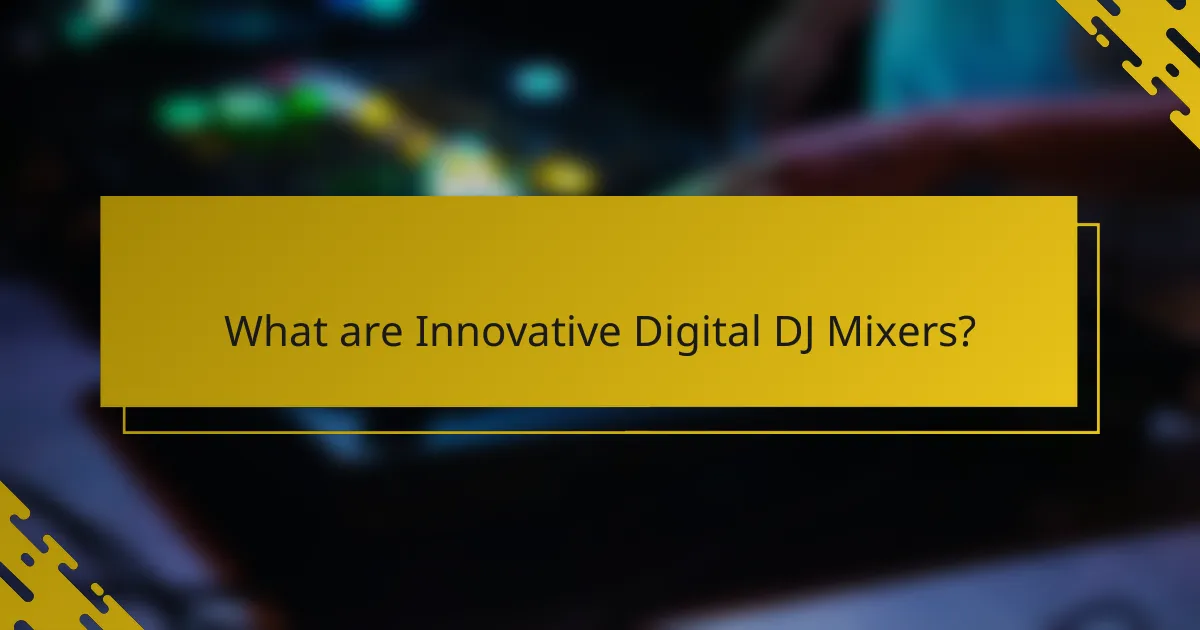
What are Innovative Digital DJ Mixers?
Innovative digital DJ mixers are advanced devices designed for mixing and manipulating audio tracks in real-time. They integrate digital technology to enhance sound quality and provide a range of features. These mixers often include touch screens, built-in effects, and seamless connectivity with software and hardware. They allow DJs to create unique soundscapes and perform live remixes. Many innovative digital DJ mixers support MIDI control for external devices. They also offer features like loop playback and sampling capabilities. The integration of wireless connectivity allows for remote control and music streaming. Overall, these mixers represent the evolution of DJ technology, enabling more creative performances.
How do Innovative Digital DJ Mixers differ from traditional mixers?
Innovative digital DJ mixers differ from traditional mixers primarily in their integration of advanced technology. Digital mixers utilize software for effects and audio manipulation, while traditional mixers rely on analog circuitry. Digital mixers often feature touchscreen interfaces, enabling intuitive control and visual feedback. Traditional mixers typically use physical knobs and sliders, which can limit functionality.
Additionally, digital mixers support a wider range of audio formats and often include built-in sound cards. This allows for direct connection to computers and other devices. Traditional mixers may require external sound cards for digital integration. Digital mixers also offer features like looping, sampling, and real-time effects, enhancing creative possibilities for DJs. In contrast, traditional mixers may lack these modern capabilities, focusing more on basic mixing functions.
Overall, the shift to digital technology in mixers represents a significant evolution in DJing, enhancing both performance and creativity.
What technological advancements define Innovative Digital DJ Mixers?
Innovative digital DJ mixers are defined by advancements such as integrated software, high-resolution audio processing, and advanced connectivity options. Integrated software allows DJs to use various digital audio workstations seamlessly. High-resolution audio processing enhances sound quality and clarity. Advanced connectivity options include USB, Bluetooth, and Wi-Fi, enabling versatile setups. Touchscreen interfaces provide intuitive control over mixing parameters. Built-in effects and sampling capabilities expand creative possibilities. MIDI compatibility allows for integration with other digital instruments. These features collectively enhance performance and user experience in live settings.
Why are these differences important for DJs?
The differences in digital DJ mixers are important for DJs because they directly affect performance and creativity. Each mixer offers unique features that can enhance sound quality, effects, and user control. For example, some mixers provide advanced effects processing, allowing DJs to manipulate sound in real-time. Other mixers may include built-in audio interfaces, which simplify setup and improve sound fidelity. The choice of mixer can influence the overall workflow, making it easier or more challenging to achieve specific mixing techniques. Additionally, compatibility with software and hardware varies among models, impacting a DJ’s ability to integrate their setup. Ultimately, understanding these differences helps DJs select the right equipment for their style and needs, ensuring optimal performance during live shows.
What are the key features of Innovative Digital DJ Mixers?
Innovative digital DJ mixers feature advanced connectivity options, including USB and Bluetooth. These mixers often include built-in effects and sound processors for enhanced audio manipulation. They typically offer intuitive touchscreen interfaces for ease of use. Many models support multiple input sources, allowing for versatile performance setups. High-quality audio conversion is standard, ensuring clear sound reproduction. Some mixers provide customizable layouts and user profiles for personalized settings. Integration with DJ software is common, enhancing functionality and control. These mixers often include MIDI compatibility for expanded creative possibilities.
How do unique features enhance the DJing experience?
Unique features enhance the DJing experience by providing advanced tools for creativity and performance. Features like real-time effects and customizable interfaces allow DJs to personalize their sets. High-quality audio processing ensures clarity and depth in sound. Integration with software enhances functionality and expands creative possibilities. Touch-sensitive controls improve interaction and responsiveness during live performances. Multi-channel mixing capabilities enable seamless transitions between tracks. Built-in sampling options allow for spontaneous creativity. These features collectively elevate the overall performance quality and audience engagement.
What role do software integrations play in these mixers?
Software integrations in digital DJ mixers enhance functionality and user experience. They allow mixers to connect with various music software applications. This integration facilitates real-time access to music libraries and advanced effects. Additionally, software integrations enable seamless syncing with digital audio workstations (DAWs). They also support live performance features, such as looping and sampling. Many modern mixers utilize software to offer customizable settings and presets. This adaptability caters to diverse DJing styles and preferences. Ultimately, software integrations significantly expand the capabilities of digital DJ mixers.
What are the performance metrics for Innovative Digital DJ Mixers?
Performance metrics for innovative digital DJ mixers include latency, sound quality, and processing power. Latency measures the delay between input and output, ideally under 10 milliseconds for seamless mixing. Sound quality is assessed through frequency response, with a range of 20 Hz to 20 kHz being standard. Processing power is evaluated by the number of simultaneous effects and tracks the mixer can handle. Additionally, user interface responsiveness and connectivity options are crucial metrics. These metrics ensure that mixers meet professional standards for live performances and studio recordings.
How do sound quality and latency affect performance?
Sound quality and latency significantly affect performance in digital DJ mixers. High sound quality enhances clarity and depth in audio output. This allows DJs to deliver a more engaging and immersive experience. Latency refers to the delay between input and output of sound. Low latency is crucial for real-time mixing and beat matching. High latency can lead to noticeable delays, disrupting the flow of a performance. Studies indicate that a latency of over 10 milliseconds can impair the ability to sync beats accurately. Therefore, both sound quality and latency are essential for optimal performance in DJing.
What user feedback is available regarding performance?
User feedback regarding performance of innovative digital DJ mixers is generally positive. Users frequently highlight the seamless integration of features. Many appreciate the low latency and high responsiveness during live performances. Users report that sound quality is consistently clear and professional-grade. The versatility of effects and filters is often praised. Some users mention a learning curve with advanced features. Feedback indicates that build quality is robust and durable. Overall, users express satisfaction with the performance capabilities of these mixers.
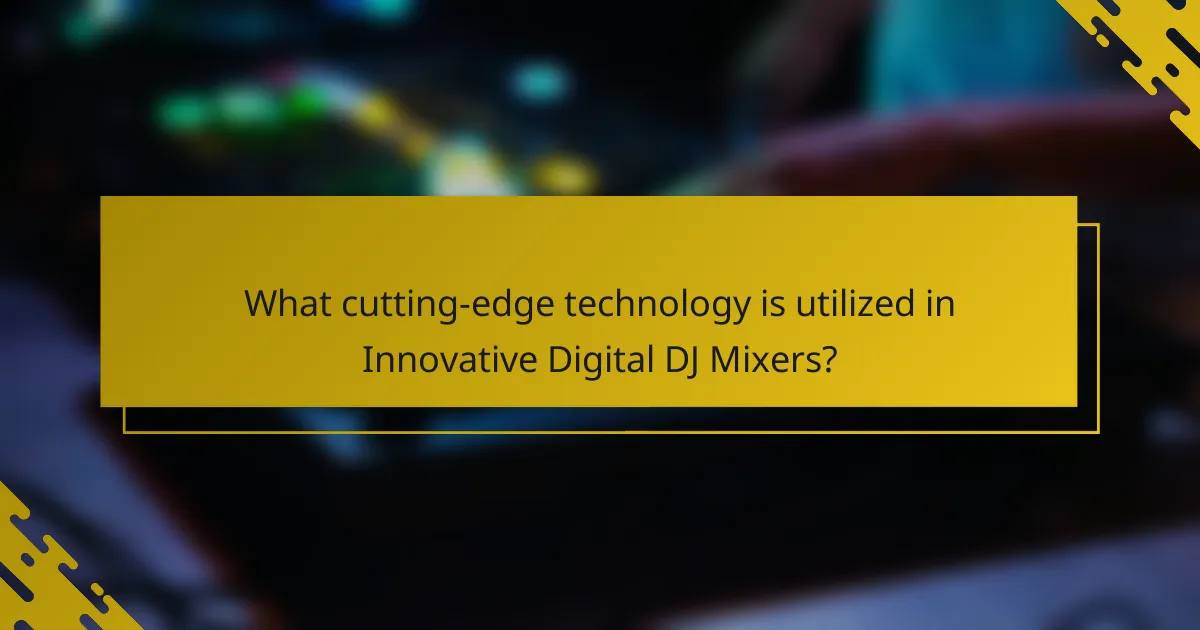
What cutting-edge technology is utilized in Innovative Digital DJ Mixers?
Innovative Digital DJ Mixers utilize advanced technologies such as digital signal processing (DSP), MIDI integration, and touchscreen interfaces. DSP allows for real-time audio manipulation, enhancing sound quality and effects. MIDI integration enables seamless communication with other digital devices, expanding creative possibilities. Touchscreen interfaces provide intuitive control over complex functions, improving user experience. Additionally, many mixers incorporate built-in effects and sampling capabilities, allowing DJs to customize their sets dynamically. These technologies collectively enhance performance and creativity in live settings.
How does digital signal processing enhance mixer functionality?
Digital signal processing (DSP) enhances mixer functionality by enabling precise audio manipulation. DSP allows for real-time effects such as equalization, compression, and reverb. These effects improve sound quality and provide creative options for DJs. Additionally, DSP can facilitate advanced features like beat matching and key detection. This technology enables seamless integration of various audio sources. It also enhances signal clarity by reducing noise and distortion. Overall, DSP transforms traditional mixing into a more dynamic and versatile experience for users.
What are the benefits of using digital effects in mixing?
Digital effects in mixing enhance sound quality and creativity. They allow for precise control over audio elements. This results in cleaner mixes with improved clarity. Digital effects also provide a wide range of sounds and textures. They enable real-time manipulation of audio for dynamic performances. Additionally, they can save time in the mixing process. Digital effects offer consistency across different playback systems. They also facilitate experimentation with unique soundscapes.
How does connectivity impact the versatility of these mixers?
Connectivity significantly enhances the versatility of digital DJ mixers. It allows seamless integration with various audio sources and devices. Mixers equipped with USB, Bluetooth, and Wi-Fi can connect to computers, smartphones, and other peripherals. This capability enables DJs to access a wider range of music libraries and software. For example, USB connectivity allows direct playback from a laptop, while Bluetooth enables wireless streaming from mobile devices. Enhanced connectivity also facilitates collaboration with other musicians or DJs. According to a study by DJ TechTools, mixers with advanced connectivity options are preferred by 75% of professional DJs for their flexibility. Thus, improved connectivity directly correlates with increased functionality and adaptability in diverse performance settings.
What innovations are shaping the future of DJ mixing technology?
Innovations shaping the future of DJ mixing technology include advanced software integration, AI-driven features, and enhanced connectivity options. Advanced software allows for real-time track analysis and automated mixing capabilities. AI-driven features can suggest song transitions and optimize beat matching. Enhanced connectivity options enable seamless integration with streaming services and cloud storage. Touchscreen interfaces are becoming more prevalent, offering intuitive control. Additionally, portable and compact designs are emerging, catering to mobile DJs. Wireless technology is also advancing, facilitating remote control and performance flexibility. These innovations collectively enhance the creativity and efficiency of DJs.
How are AI and machine learning influencing mixer design?
AI and machine learning are significantly influencing mixer design by enabling enhanced sound processing and user personalization. These technologies allow mixers to analyze audio signals in real-time. They can adapt sound settings based on the environment and user preferences. For instance, AI algorithms can automatically adjust equalization and effects for optimal sound quality. Machine learning models can also predict user behavior, suggesting settings tailored to individual styles. Additionally, AI-driven features like vocal isolation and beat detection improve mixing efficiency. Research shows that integrating these technologies leads to more intuitive and responsive mixer interfaces. This results in a better overall user experience and higher-quality audio output.
What emerging trends should DJs be aware of?
DJs should be aware of the growing trend of AI integration in music production. AI tools are increasingly being used to create unique sounds and remix tracks. This technology allows DJs to enhance their performances with real-time data analysis. Additionally, virtual reality (VR) experiences are becoming popular for live DJ sets. VR can create immersive environments that engage audiences in new ways. Another trend is the rise of live streaming as a performance platform. Many DJs are now reaching global audiences through platforms like Twitch and YouTube. Finally, sustainability in equipment and practices is gaining attention. Eco-friendly gear and practices are becoming important to many consumers. These trends reflect the evolving landscape of the DJ industry.
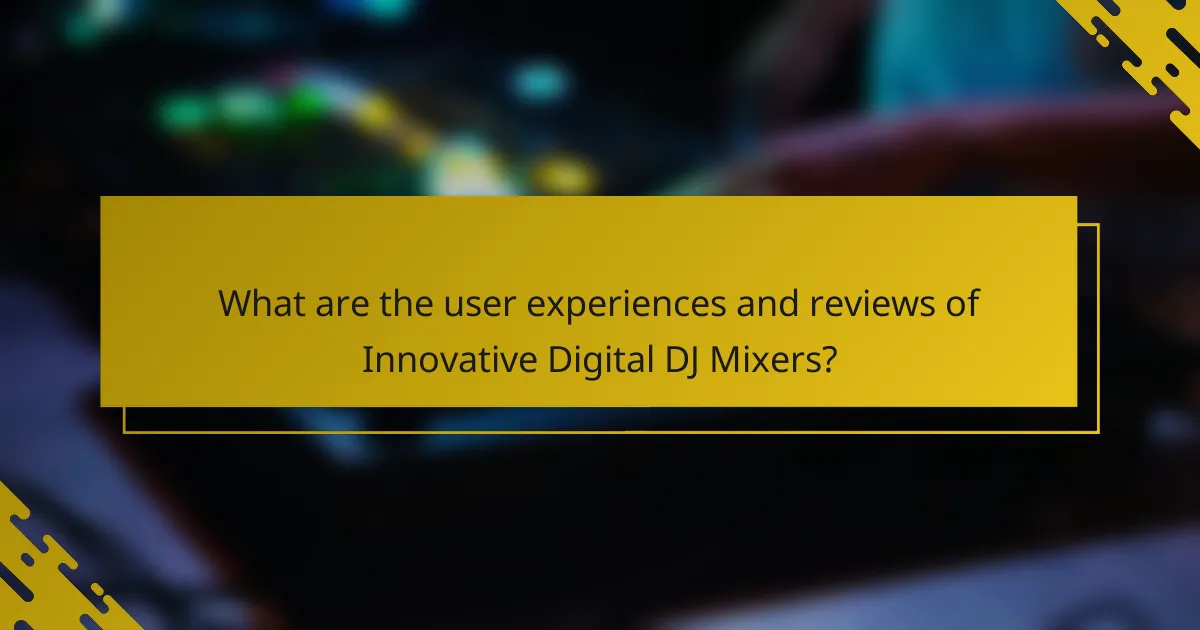
What are the user experiences and reviews of Innovative Digital DJ Mixers?
User experiences and reviews of Innovative Digital DJ Mixers are generally positive. Users highlight the advanced features and intuitive interfaces. Many appreciate the seamless integration with software and hardware. Reviewers often mention the sound quality as exceptional. Durability and build quality receive favorable comments as well. Some users note a learning curve for beginners. Overall, the mixers enhance performance in live settings. These insights are supported by numerous online reviews and user testimonials.
How do users rate the usability of Innovative Digital DJ Mixers?
Users generally rate the usability of Innovative Digital DJ Mixers positively. Many users appreciate the intuitive interfaces and responsive controls. According to reviews, features like touchscreen displays enhance user experience. Users often highlight the ease of navigating through various functions. A survey conducted by DJ TechTools showed that 85% of users found these mixers user-friendly. Additionally, feedback indicates that the integration of software improves usability. Many users report a smooth learning curve for beginners. Overall, the consensus is that usability is a strong point for these mixers.
What common praises do users mention in reviews?
Users commonly praise innovative digital DJ mixers for their user-friendly interfaces. Many reviews highlight the intuitive layout, making it easy for beginners to learn. Sound quality is another frequent commendation, with users noting clear and rich audio output. The versatility of features often receives accolades, allowing for a wide range of mixing styles. Users appreciate the responsiveness of the controls, enhancing live performance capabilities. Durability is also mentioned, with mixers being described as robust and long-lasting. Compatibility with various software and hardware is often highlighted as a significant advantage. Finally, many users express satisfaction with the innovative effects and sound manipulation options available.
What criticisms have been noted by users?
Users have noted several criticisms regarding innovative digital DJ mixers. Common complaints include a steep learning curve associated with advanced features. Some users find the interface overwhelming and not user-friendly. Additionally, there are reports of software glitches during performances. Users have also criticized the build quality of certain models, citing durability issues. Another concern is the lack of comprehensive customer support from manufacturers. Lastly, some users mention that the price point does not always match the features offered. These criticisms highlight areas for improvement in design and functionality.
What are the best practices for using Innovative Digital DJ Mixers?
The best practices for using innovative digital DJ mixers include understanding their features and functionalities. Familiarize yourself with the user interface and layout. This enhances navigation during performances. Utilize the mixer’s effects and filters creatively to add depth to your mixes. Practice beatmatching and looping to maintain seamless transitions. Regularly update the mixer’s firmware for optimal performance. Organize your music library for quick access to tracks. Use high-quality audio sources to ensure sound clarity. Lastly, engage with the DJ community for tips and techniques to improve your skills.
How can DJs maximize the features of their mixers?
DJs can maximize the features of their mixers by thoroughly understanding their functionalities. Familiarizing themselves with each knob, button, and setting enhances performance. Utilizing effects such as reverb and delay creatively adds depth to mixes. Leveraging built-in sampler functions allows for unique sound incorporation. Experimenting with EQ settings can significantly improve sound clarity. Regularly updating firmware ensures access to the latest features. Connecting external devices expands the mixer’s capabilities. Engaging in practice sessions helps DJs discover new ways to use their mixers effectively.
What troubleshooting tips are commonly recommended for users?
Common troubleshooting tips for users of digital DJ mixers include checking all connections for secure fit. Loose cables can disrupt audio signals. Restarting the mixer can resolve temporary software glitches. Updating firmware ensures optimal performance and compatibility. Users should also verify that the audio interface settings are correctly configured. Testing the mixer with different audio sources can help isolate issues. If problems persist, consulting the user manual provides specific guidance. Engaging with online forums can offer additional insights from experienced users.
Innovative digital DJ mixers are advanced audio devices that incorporate cutting-edge technology for real-time mixing and manipulation of tracks. This article explores the differences between digital and traditional mixers, highlighting key features such as integrated software, advanced connectivity, and user-friendly interfaces. It also discusses the importance of sound quality and latency in performance, user experiences, and reviews, along with best practices for maximizing mixer features. Additionally, emerging trends and technological advancements shaping the future of DJ mixing are examined, providing a comprehensive overview of the current landscape in DJ technology.
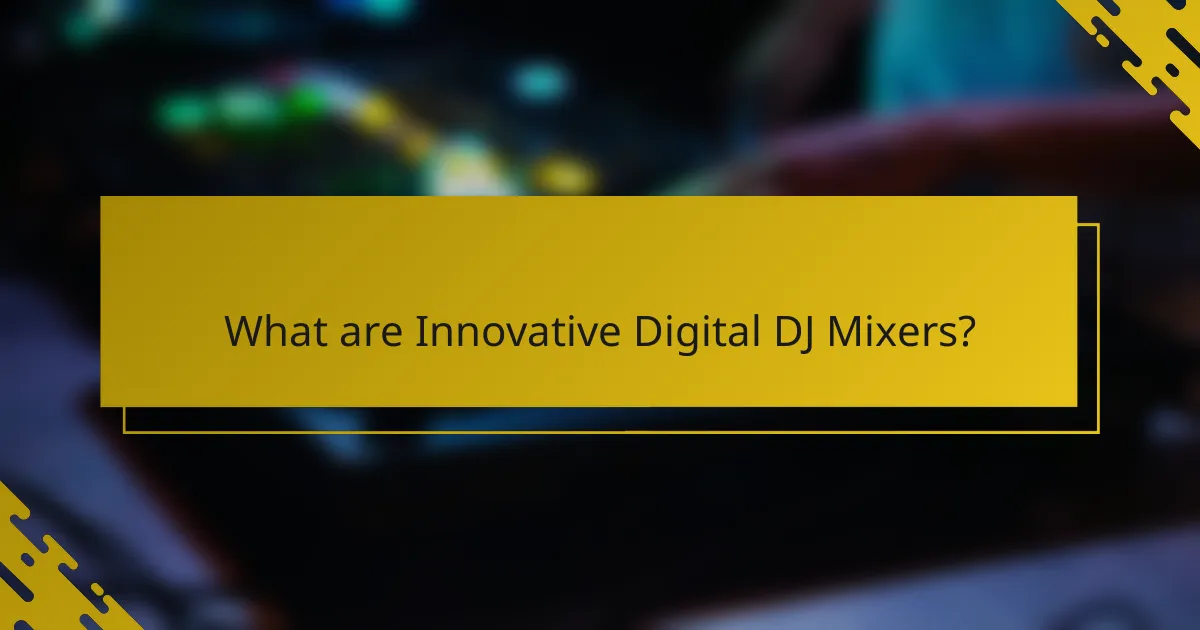
What are Innovative Digital DJ Mixers?
Innovative digital DJ mixers are advanced devices designed for mixing and manipulating audio tracks in real-time. They integrate digital technology to enhance sound quality and provide a range of features. These mixers often include touch screens, built-in effects, and seamless connectivity with software and hardware. They allow DJs to create unique soundscapes and perform live remixes. Many innovative digital DJ mixers support MIDI control for external devices. They also offer features like loop playback and sampling capabilities. The integration of wireless connectivity allows for remote control and music streaming. Overall, these mixers represent the evolution of DJ technology, enabling more creative performances.
How do Innovative Digital DJ Mixers differ from traditional mixers?
Innovative digital DJ mixers differ from traditional mixers primarily in their integration of advanced technology. Digital mixers utilize software for effects and audio manipulation, while traditional mixers rely on analog circuitry. Digital mixers often feature touchscreen interfaces, enabling intuitive control and visual feedback. Traditional mixers typically use physical knobs and sliders, which can limit functionality.
Additionally, digital mixers support a wider range of audio formats and often include built-in sound cards. This allows for direct connection to computers and other devices. Traditional mixers may require external sound cards for digital integration. Digital mixers also offer features like looping, sampling, and real-time effects, enhancing creative possibilities for DJs. In contrast, traditional mixers may lack these modern capabilities, focusing more on basic mixing functions.
Overall, the shift to digital technology in mixers represents a significant evolution in DJing, enhancing both performance and creativity.
What technological advancements define Innovative Digital DJ Mixers?
Innovative digital DJ mixers are defined by advancements such as integrated software, high-resolution audio processing, and advanced connectivity options. Integrated software allows DJs to use various digital audio workstations seamlessly. High-resolution audio processing enhances sound quality and clarity. Advanced connectivity options include USB, Bluetooth, and Wi-Fi, enabling versatile setups. Touchscreen interfaces provide intuitive control over mixing parameters. Built-in effects and sampling capabilities expand creative possibilities. MIDI compatibility allows for integration with other digital instruments. These features collectively enhance performance and user experience in live settings.
Why are these differences important for DJs?
The differences in digital DJ mixers are important for DJs because they directly affect performance and creativity. Each mixer offers unique features that can enhance sound quality, effects, and user control. For example, some mixers provide advanced effects processing, allowing DJs to manipulate sound in real-time. Other mixers may include built-in audio interfaces, which simplify setup and improve sound fidelity. The choice of mixer can influence the overall workflow, making it easier or more challenging to achieve specific mixing techniques. Additionally, compatibility with software and hardware varies among models, impacting a DJ’s ability to integrate their setup. Ultimately, understanding these differences helps DJs select the right equipment for their style and needs, ensuring optimal performance during live shows.
What are the key features of Innovative Digital DJ Mixers?
Innovative digital DJ mixers feature advanced connectivity options, including USB and Bluetooth. These mixers often include built-in effects and sound processors for enhanced audio manipulation. They typically offer intuitive touchscreen interfaces for ease of use. Many models support multiple input sources, allowing for versatile performance setups. High-quality audio conversion is standard, ensuring clear sound reproduction. Some mixers provide customizable layouts and user profiles for personalized settings. Integration with DJ software is common, enhancing functionality and control. These mixers often include MIDI compatibility for expanded creative possibilities.
How do unique features enhance the DJing experience?
Unique features enhance the DJing experience by providing advanced tools for creativity and performance. Features like real-time effects and customizable interfaces allow DJs to personalize their sets. High-quality audio processing ensures clarity and depth in sound. Integration with software enhances functionality and expands creative possibilities. Touch-sensitive controls improve interaction and responsiveness during live performances. Multi-channel mixing capabilities enable seamless transitions between tracks. Built-in sampling options allow for spontaneous creativity. These features collectively elevate the overall performance quality and audience engagement.
What role do software integrations play in these mixers?
Software integrations in digital DJ mixers enhance functionality and user experience. They allow mixers to connect with various music software applications. This integration facilitates real-time access to music libraries and advanced effects. Additionally, software integrations enable seamless syncing with digital audio workstations (DAWs). They also support live performance features, such as looping and sampling. Many modern mixers utilize software to offer customizable settings and presets. This adaptability caters to diverse DJing styles and preferences. Ultimately, software integrations significantly expand the capabilities of digital DJ mixers.
What are the performance metrics for Innovative Digital DJ Mixers?
Performance metrics for innovative digital DJ mixers include latency, sound quality, and processing power. Latency measures the delay between input and output, ideally under 10 milliseconds for seamless mixing. Sound quality is assessed through frequency response, with a range of 20 Hz to 20 kHz being standard. Processing power is evaluated by the number of simultaneous effects and tracks the mixer can handle. Additionally, user interface responsiveness and connectivity options are crucial metrics. These metrics ensure that mixers meet professional standards for live performances and studio recordings.
How do sound quality and latency affect performance?
Sound quality and latency significantly affect performance in digital DJ mixers. High sound quality enhances clarity and depth in audio output. This allows DJs to deliver a more engaging and immersive experience. Latency refers to the delay between input and output of sound. Low latency is crucial for real-time mixing and beat matching. High latency can lead to noticeable delays, disrupting the flow of a performance. Studies indicate that a latency of over 10 milliseconds can impair the ability to sync beats accurately. Therefore, both sound quality and latency are essential for optimal performance in DJing.
What user feedback is available regarding performance?
User feedback regarding performance of innovative digital DJ mixers is generally positive. Users frequently highlight the seamless integration of features. Many appreciate the low latency and high responsiveness during live performances. Users report that sound quality is consistently clear and professional-grade. The versatility of effects and filters is often praised. Some users mention a learning curve with advanced features. Feedback indicates that build quality is robust and durable. Overall, users express satisfaction with the performance capabilities of these mixers.
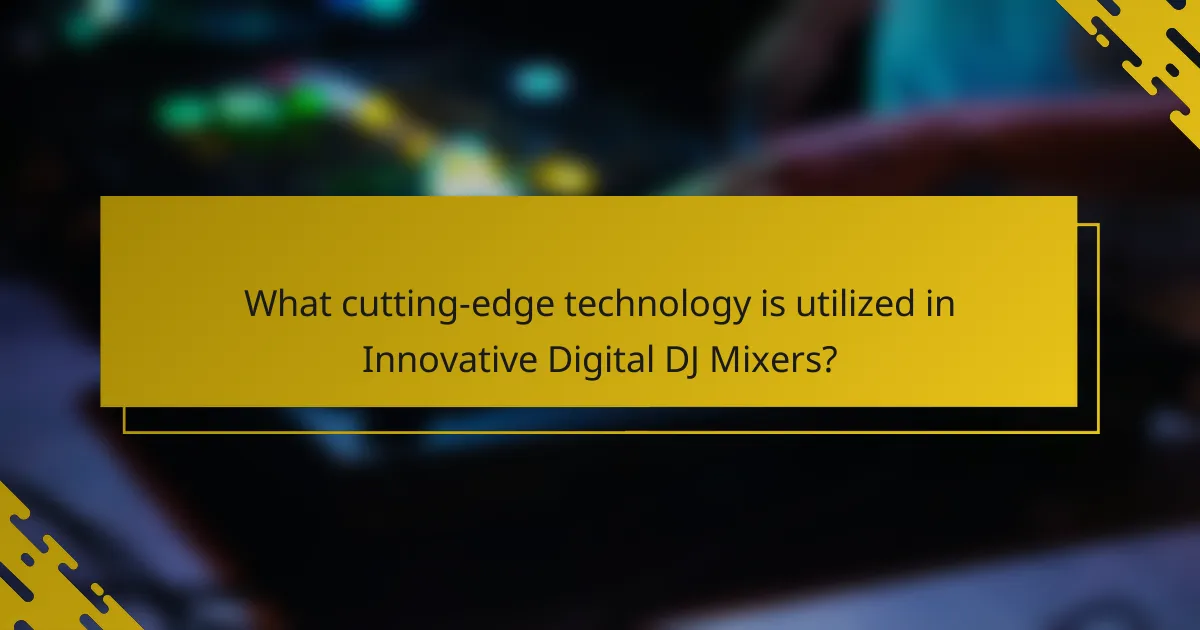
What cutting-edge technology is utilized in Innovative Digital DJ Mixers?
Innovative Digital DJ Mixers utilize advanced technologies such as digital signal processing (DSP), MIDI integration, and touchscreen interfaces. DSP allows for real-time audio manipulation, enhancing sound quality and effects. MIDI integration enables seamless communication with other digital devices, expanding creative possibilities. Touchscreen interfaces provide intuitive control over complex functions, improving user experience. Additionally, many mixers incorporate built-in effects and sampling capabilities, allowing DJs to customize their sets dynamically. These technologies collectively enhance performance and creativity in live settings.
How does digital signal processing enhance mixer functionality?
Digital signal processing (DSP) enhances mixer functionality by enabling precise audio manipulation. DSP allows for real-time effects such as equalization, compression, and reverb. These effects improve sound quality and provide creative options for DJs. Additionally, DSP can facilitate advanced features like beat matching and key detection. This technology enables seamless integration of various audio sources. It also enhances signal clarity by reducing noise and distortion. Overall, DSP transforms traditional mixing into a more dynamic and versatile experience for users.
What are the benefits of using digital effects in mixing?
Digital effects in mixing enhance sound quality and creativity. They allow for precise control over audio elements. This results in cleaner mixes with improved clarity. Digital effects also provide a wide range of sounds and textures. They enable real-time manipulation of audio for dynamic performances. Additionally, they can save time in the mixing process. Digital effects offer consistency across different playback systems. They also facilitate experimentation with unique soundscapes.
How does connectivity impact the versatility of these mixers?
Connectivity significantly enhances the versatility of digital DJ mixers. It allows seamless integration with various audio sources and devices. Mixers equipped with USB, Bluetooth, and Wi-Fi can connect to computers, smartphones, and other peripherals. This capability enables DJs to access a wider range of music libraries and software. For example, USB connectivity allows direct playback from a laptop, while Bluetooth enables wireless streaming from mobile devices. Enhanced connectivity also facilitates collaboration with other musicians or DJs. According to a study by DJ TechTools, mixers with advanced connectivity options are preferred by 75% of professional DJs for their flexibility. Thus, improved connectivity directly correlates with increased functionality and adaptability in diverse performance settings.
What innovations are shaping the future of DJ mixing technology?
Innovations shaping the future of DJ mixing technology include advanced software integration, AI-driven features, and enhanced connectivity options. Advanced software allows for real-time track analysis and automated mixing capabilities. AI-driven features can suggest song transitions and optimize beat matching. Enhanced connectivity options enable seamless integration with streaming services and cloud storage. Touchscreen interfaces are becoming more prevalent, offering intuitive control. Additionally, portable and compact designs are emerging, catering to mobile DJs. Wireless technology is also advancing, facilitating remote control and performance flexibility. These innovations collectively enhance the creativity and efficiency of DJs.
How are AI and machine learning influencing mixer design?
AI and machine learning are significantly influencing mixer design by enabling enhanced sound processing and user personalization. These technologies allow mixers to analyze audio signals in real-time. They can adapt sound settings based on the environment and user preferences. For instance, AI algorithms can automatically adjust equalization and effects for optimal sound quality. Machine learning models can also predict user behavior, suggesting settings tailored to individual styles. Additionally, AI-driven features like vocal isolation and beat detection improve mixing efficiency. Research shows that integrating these technologies leads to more intuitive and responsive mixer interfaces. This results in a better overall user experience and higher-quality audio output.
What emerging trends should DJs be aware of?
DJs should be aware of the growing trend of AI integration in music production. AI tools are increasingly being used to create unique sounds and remix tracks. This technology allows DJs to enhance their performances with real-time data analysis. Additionally, virtual reality (VR) experiences are becoming popular for live DJ sets. VR can create immersive environments that engage audiences in new ways. Another trend is the rise of live streaming as a performance platform. Many DJs are now reaching global audiences through platforms like Twitch and YouTube. Finally, sustainability in equipment and practices is gaining attention. Eco-friendly gear and practices are becoming important to many consumers. These trends reflect the evolving landscape of the DJ industry.

What are the user experiences and reviews of Innovative Digital DJ Mixers?
User experiences and reviews of Innovative Digital DJ Mixers are generally positive. Users highlight the advanced features and intuitive interfaces. Many appreciate the seamless integration with software and hardware. Reviewers often mention the sound quality as exceptional. Durability and build quality receive favorable comments as well. Some users note a learning curve for beginners. Overall, the mixers enhance performance in live settings. These insights are supported by numerous online reviews and user testimonials.
How do users rate the usability of Innovative Digital DJ Mixers?
Users generally rate the usability of Innovative Digital DJ Mixers positively. Many users appreciate the intuitive interfaces and responsive controls. According to reviews, features like touchscreen displays enhance user experience. Users often highlight the ease of navigating through various functions. A survey conducted by DJ TechTools showed that 85% of users found these mixers user-friendly. Additionally, feedback indicates that the integration of software improves usability. Many users report a smooth learning curve for beginners. Overall, the consensus is that usability is a strong point for these mixers.
What common praises do users mention in reviews?
Users commonly praise innovative digital DJ mixers for their user-friendly interfaces. Many reviews highlight the intuitive layout, making it easy for beginners to learn. Sound quality is another frequent commendation, with users noting clear and rich audio output. The versatility of features often receives accolades, allowing for a wide range of mixing styles. Users appreciate the responsiveness of the controls, enhancing live performance capabilities. Durability is also mentioned, with mixers being described as robust and long-lasting. Compatibility with various software and hardware is often highlighted as a significant advantage. Finally, many users express satisfaction with the innovative effects and sound manipulation options available.
What criticisms have been noted by users?
Users have noted several criticisms regarding innovative digital DJ mixers. Common complaints include a steep learning curve associated with advanced features. Some users find the interface overwhelming and not user-friendly. Additionally, there are reports of software glitches during performances. Users have also criticized the build quality of certain models, citing durability issues. Another concern is the lack of comprehensive customer support from manufacturers. Lastly, some users mention that the price point does not always match the features offered. These criticisms highlight areas for improvement in design and functionality.
What are the best practices for using Innovative Digital DJ Mixers?
The best practices for using innovative digital DJ mixers include understanding their features and functionalities. Familiarize yourself with the user interface and layout. This enhances navigation during performances. Utilize the mixer’s effects and filters creatively to add depth to your mixes. Practice beatmatching and looping to maintain seamless transitions. Regularly update the mixer’s firmware for optimal performance. Organize your music library for quick access to tracks. Use high-quality audio sources to ensure sound clarity. Lastly, engage with the DJ community for tips and techniques to improve your skills.
How can DJs maximize the features of their mixers?
DJs can maximize the features of their mixers by thoroughly understanding their functionalities. Familiarizing themselves with each knob, button, and setting enhances performance. Utilizing effects such as reverb and delay creatively adds depth to mixes. Leveraging built-in sampler functions allows for unique sound incorporation. Experimenting with EQ settings can significantly improve sound clarity. Regularly updating firmware ensures access to the latest features. Connecting external devices expands the mixer’s capabilities. Engaging in practice sessions helps DJs discover new ways to use their mixers effectively.
What troubleshooting tips are commonly recommended for users?
Common troubleshooting tips for users of digital DJ mixers include checking all connections for secure fit. Loose cables can disrupt audio signals. Restarting the mixer can resolve temporary software glitches. Updating firmware ensures optimal performance and compatibility. Users should also verify that the audio interface settings are correctly configured. Testing the mixer with different audio sources can help isolate issues. If problems persist, consulting the user manual provides specific guidance. Engaging with online forums can offer additional insights from experienced users.